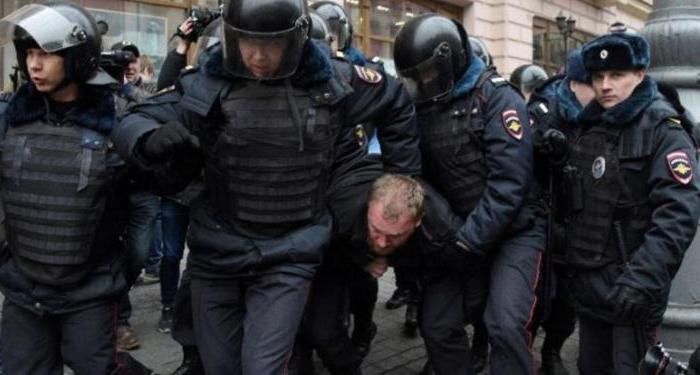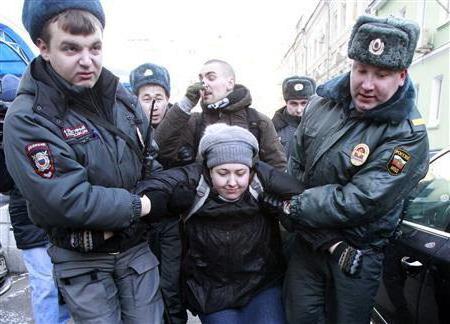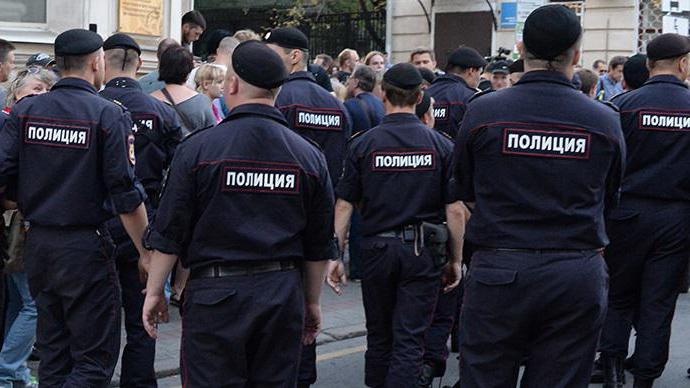All Russian citizens should be aware that the requirements of the police are mandatory. And what could entail non-compliance with the legal requirements of police officers? What liability is established for such a violation of legal norms? Answers to these questions will be provided in the article.
What rights do the police have?
To begin with, it is worthwhile to tell in detail about the powers of the police established by law. According to the Federal Law "On Police", all representatives of the structure in question are endowed with a number of duties and rights. It is worth highlighting the main types of police powers:
- verification of citizens' documents, if there are specific suspicions of involvement in the commission of offenses;
- making demands to leave the scene of the crime;
- invitation or forced delivery of citizens to the police station in connection with the investigation of a particular case;
- making demands to stop committing acts that violate the law;
- the use of physical force and firearms for self-defense or suppression of resistance;
- the delivery of citizens intoxicated to the hospital;
- visiting individual organizations to familiarize themselves with the documentation necessary for conducting an investigation, as well as requesting documents for investigation from ordinary citizens.
Of course, this is not all the functions and responsibilities that a representative of the police structure has. However, penalties for failure to comply with the legal requirements of a police officer cannot be avoided. Such punishment can be expressed in two forms: administrative responsibility and criminal. Each of the forms will be described in detail below.
On administrative responsibility for failure to comply with the legal requirements of a police officer
The Code of Administrative Violations of the Law (hereinafter CAO) contains article 19.3. Part 1 of this article deals with penalties for disobedience to police officers who made legal claims against a citizen. When does the responsibility for the alleged offense come? It is worth noting here:
- refusal on the part of a citizen to comply with legal and justified orders of a police representative if the latter is engaged in the protection of public order and security;
- deliberate creation of any obstacles to a law enforcement officer in the latter's exercise of his professional duties.

Thus, any refusal of a citizen to satisfy the legal requirements of a policeman while performing his official duties will be regarded as a violation of the law. In this case, the citizen will be administratively liable for failure to comply with legal requirements of both the police officer and representatives of the FSB, migration authorities, the FSKN and the FSIN.
Criminal liability: Article 318 of the Criminal Code of the Russian Federation
If the imposition of administrative responsibility entails relatively “light” sanctions in the form of fines or short arrests, then criminal liability will have much more serious and serious consequences. But how do the courts distinguish between administrative and criminal law violations?  In short, a detained citizen who is physically resisting police officers (for example, refusing to go to the police station, get into an autopack, or present documents) will be subject to administrative responsibility.And a person who not only resisted, but also tried to inflict physical damage on the police or insult them, will be subject to criminal liability.
In short, a detained citizen who is physically resisting police officers (for example, refusing to go to the police station, get into an autopack, or present documents) will be subject to administrative responsibility.And a person who not only resisted, but also tried to inflict physical damage on the police or insult them, will be subject to criminal liability.
Thus, failure to comply with the legal requirements of a police officer under the Code of Administrative Offenses and the Criminal Code is very different. Subsequent types of sanctions vary significantly here.
About illegal police claims
The Russian Federation is a state with a huge number of police officers. Naturally, in any "police" country, a violation by law enforcement officials of their official duties will be a frequent occurrence. If, with the failure to comply with the legal requirements of the police, it is more or less clear, then what to do in a situation where the police officer makes demands that do not meet official standards? Will sanctions follow for disobedience?
The situation, I must say, is rather complicated. The most common violation on the part of police officers is the demand for documents without any reason. Ordinary citizens often like to ask a question about the reason for such a check. The result here is almost always the same: forcible transfer to the police department, where a protocol of disobedience is drawn up. It is easy to guess that a citizen may not have so much evidence in such a situation. Police officers are officials, and therefore the court is inclined to trust them, rather than a simple citizen.
Resolving a situation with illegal claims
Contrary to popular belief, it is not the duty of Russian citizens to constantly carry an identity card with them. A citizen should not bear any responsibility in cases where he is not able to present the appropriate document to a police officer.
How should a police request be presented? By law, a representative of the law enforcement system must introduce himself and state a clear reason for checking documents. If the citizen wishes, then the employee must show the certificate. An explanation of the reason for the verification should be approximately as follows:
- a person, according to the policeman, could have escaped from a place of imprisonment;
- a citizen looks like an intruder with a photobot;
- a person has entered a private or protected area;
- a citizen might have noticed a mental disorder, etc.
If the situation is not in the best way, and the citizen is being “sewed” with an illegal charge of disobedience, then the only and most optimal option would be to contact a trusted lawyer.
Is there a difference between disobedience and resistance?
It would seem that failure to comply with the lawful requirements of a police officer under the Code of Administrative Offenses of the Russian Federation or under the Criminal Code is one and the same act violating the law, in a more or less criminal form. At the same time, lawyers divide the concept into two types: resistance and disobedience. Disobedience, according to experts, is passive. This is a simple refusal to comply with the requirements of the authorities, that is, inaction violating the right. As a rule, it is precisely for disobedience that an administrative protocol of non-compliance with the legal requirements of a police officer is issued. 
If we are talking about resistance, then you need to point out deliberate and deliberate actions, usually with the use of physical force. For this, the guilty citizens are sanctioned by the Criminal Code of the Russian Federation, Art. 318 "failure to comply with the lawful requirements of a police officer."
About administrative sanctions
For actions or omissions that could prevent a police officer from fulfilling his professional duties, a citizen will be fined up to 1 thousand rubles. It is easy to guess that this sanction is spelled out in the Code of Administrative Offenses of the Russian Federation. There is not a pleasant alternative here - administrative arrest up to 15 days.
In all cases, the case will be decided by the judge of the first instance - the so-called magistrate.The district court decides cases involving criminal liability, the sanctions of which will be described later.
About criminal sanctions
Insulting a policeman, according to Article 319 of the Criminal Code of the Russian Federation, will entail a fine of 40 thousand rubles or a three-month salary. For disobedience to a law enforcement officer, who was regarded by the court as a crime, the following penalties may be imposed:
- half year arrest;
- forced labor for up to 5 years;
- imprisonment of up to 10 years;
- particularly large fines.

In the Criminal Code, No. 318, the article "failure to comply with the lawful requirements of a police officer" also refers to resistance. Here, a fine can reach 1 million rubles, and forced labor can amount to seven years - just like imprisonment.
On the authority of the traffic police
More often, Russian citizens come into contact not even with ordinary police officers, but with traffic police officers. A phenomenon such as failure to comply with the legal requirements of a police officer is also possible here. About stopping citizens by representatives of the police traffic police and their authority will be described below.
According to the law, the traffic police officer has the right:
- to check documents from citizens who may be involved in violations of the law;
- to request documentation for the implementation of inspections;
- to appeal to passersby with a request to leave the place of violation of the right;
- to escort citizens to medical facilities, etc.
When a traffic police officer stops one or another driver, he is obliged to introduce himself, present a certificate and clearly formulate his requirements.
And the second: a police officer is obliged to present an official ID FOR CITIZEN REQUIREMENT (Federal Law No. 3 "On Police" dated 07.02.2011, paragraphs 1, paragraph 4, article 5).
Do not mislead people.